Are you a teacher who’s considering transitioning from teaching to another career? You’re far from alone.
Since the pandemic, the number of teachers changing careers (or planning to) has risen dramatically: over half (55%) of National Education Association (NEA) members report that they’re planning on transitioning out of teaching sooner than they originally planned.
Among all the possible industries and jobs teachers can switch to, tech stands out for many reasons. Tech jobs offer teachers a fulfilling, lucrative way to use their skills and pursue some of the same dreams that led them to teaching in the first place.
Whether you’re motivated by the potential for higher salaries, greater opportunities for career growth, or a better work-life balance, there are a lot of reasons to be curious about the best jobs for teachers leaving education.
However, it’s also natural to wonder if you can actually make it and be a good fit in a completely new industry.

Plus, while the tech industry is incredibly appealing for a lot of reasons, it might feel worlds apart from education…
- You don’t want to feel like you’re selling out. How could you use your skills in a way that would still be making a difference?
- Many teachers don’t have the means to quit their jobs to retrain. How will you be able to get the skills you need for a new career while you’re still working?
- You may not fit the “developer” stereotype… Could someone like you even get a job in tech?
In this post, sponsored by TripleTen, we’ll examine these fears (and more), to help you decide if a career change from teaching to software/IT might be the right move for you.
Fear #1: Teaching is about making a difference. Is that possible in tech?
For most teachers, teaching isn’t just a job; it’s a way to make a difference to the lives of young people.
At first glance, tech careers don’t seem particularly mission-driven in the way teaching is. The idea of leaving teaching for tech could feel like you’re “selling out” and chasing money over meaning.
But that really doesn’t have to be the case.

What makes technology meaningful
When you boil it down to its simplest form, technology is about creating solutions to problems. That’s why Encyclopedia Britannica defines it as “the application of scientific knowledge to the practical aims of human life.”
Some of the earliest forms of technology were stone tools to help humans build, hunt, and prepare food. Wheels were invented to help us transport people and resources. Fast forwarding to the modern day, Google helps people find information, Fitbit helps people monitor and improve their health, etc.
By learning tech skills, you equip yourself with a tool for solving problems. 🛠️
And it’s up to you which problems you solve! No matter what you’re passionate about—the environment, healthcare, diversity—you can use tech skills to advance those causes.
Just look at Climatebase – a hiring platform dedicated to helping companies working on the climate crisis to hire mission-driven employees. 🌎
At the time of writing, here are some of the job listings there:
- Java Engineer at Banyan Infrastructure – a FinTech solution to unlock capital for renewable infrastructure
- Backend Engineer at SustainCERT – a platform that helps quantify and report on the social and environmental impacts of sustainability interventions
- Software Engineer at Aeroseal – their climate technology makes buildings more energy efficient
And if you’re not ready to completely disengage from your educational ambitions, there are plenty of mission-focused tech jobs for teachers. In fact, that ties into this next fear. 👇
☝️ Back to top
Fear #2: I’d be abandoning my students and colleagues
As a teacher, you’re probably all too aware of the many problems in education and the difficulties young people face. You’ve also seen the blood, sweat, and tears that your colleagues put in every day.
There can be a lot of guilt wrapped up in making a career change for teachers. 😔
However, there are so many startups and companies focusing on solving problems in education that it even has its own term: EdTech (for “educational technology”).
Some of the ideal jobs for ex-teachers exist in this sweet spot.

EdTech organizations are mission-driven companies that, in many ways, are trying to make the same kind of difference that teachers do in the classroom.
As a teacher, you’d be a natural fit in this space, since you have personal experience with the challenges that teachers, students, and administrators deal with on a daily basis.
Getting into tech could be the way you can address some of the problems you feel most strongly about. 💪
Let’s look at three examples and some of the people paving the way in their EdTech careers. 👇
Example 1: Build tools to help children learn better
This is the route chosen by TripleTen grad Tiffany Hall.
After working as a special education teacher, she got a job as a developer at Learning Ovations Incorporated—a testing platform that helps teachers deliver differentiated instruction to children IEPs.
She then went on to work in the Education Solutions branch on the Digital Engineering Team at Scholastic, helping develop research-based literacy instruction.

Example 2: Use technology to improve how schools operate
After his transition into tech, TripleTen grad Tristan Boyd joined the engineering team at an EdTech company called Remind, which is dedicated to creating tools to help schools operate.
Remind creates systems for schools to keep track of all their student information, and facilitate teacher-student interactions, and Tristan specifically works with the internal tools that bring these features to life.
Paul Rose is another example. After spending over a decade working in early education, he left to start his own EdTech company called YouTeachMe.
The company’s primary focus is providing an inclusive approach to education that supports teachers’ physical and mental health. In an environment where so many education professionals experience burnout, work like this matters.
Start coding now
Stop waiting and start learning! Get my 10 tips on teaching yourself how to code.
Example 3: Train educators and help them adopt new technologies
Victoria Thompson taught fifth- and sixth-grade math and science before pivoting to focus on STEM integration in schools. As an Industry Executive at Microsoft, she helps support account teams in digital transformation initiatives in 23 states.

➡️ If continuing to improve the lives of your students and coworkers is really important to you, there will be lots of ways you can do that using technology. If you want to make a difference, learning tech skills opens up so many opportunities. 💪
☝️ Back to top
Fear #3: Could someone like me even work in tech?
There’s a stereotype out there about what a developer looks like—and it’s true that this is a symptom of the tech industry’s problem with diversity.
But the flip side is that modern companies are aware of this issue and are actively looking to diversify their teams. Your voice belongs at the table! 📣
You can get into tech even if you defy the stereotype
Step one: don’t pigeonhole yourself. There are so many examples of people who got into tech regardless of their professional background!
For example:
- Rachelle Perez worked in tourism sales ✈️
- Danny Thompson was a gas station fry cook 👨🏾🍳
- Chris Misterek was a worship pastor ⛪
- Yuffie Hu was a music therapist 🎻
- Michael Poage was a film student and rugby player 🏉
- Madison Kanna was a model 💁
(A surprising number of these people found that their previous careers actually helped with their new ones instead of working against them, by the way.)
Eileen Ho believed she wasn’t good at math and wasn’t a computer person. She became a math teacher, and then a software engineer.
“Don’t box yourself like that,” she says. “Intelligence can be grown, we can work towards it, we can build it, no matter what area it is, whether you had a previous interest in it or not.”
Rebecca Lima has been the only woman in the room and the youngest person in the room. She shares lots of tips on overcoming imposter syndrome on the Learn to Code With Me Podcast.

Don’t be afraid to take advantage of resources. That’s what they’re there for!
Here are 43 tech resources for people of color. For female teachers transitioning to new careers, listen to our episode with Seema Gururaj. Seema is the founder and CEO of Square Circle, a platform that helps women technologists grow their profiles within the tech industry.
During your job hunt, take intentional steps to look for inclusive companies. Jenn Clevenger, Data Engineering Director at Etsy, recommends using the interview stage to ask questions about a company’s parental leave policy, remote working options, attitudes to work/life balance, etc.
Lack of diversity is actually a reason to get into tech
In order for the tech industry to truly serve all different kinds of people, it desperately needs a wider diversity of perspectives on the team.
Right now, here’s how some key demographics stack up in the industry…
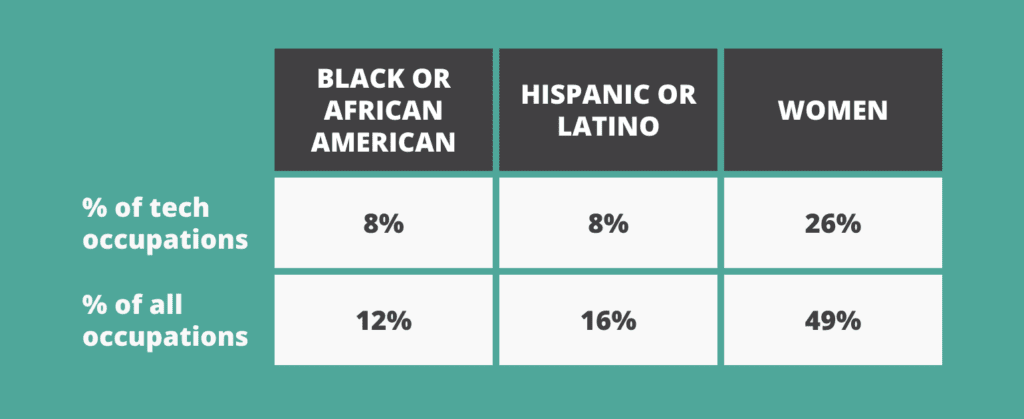
As educator-turned-software-engineer Dana Lee says, “The tech world needs more people like me—a first generation immigrant, woman of color, bi-cultural, multilingual and from a non-traditional career path into tech—to represent the diversity and the humans it serves.”
Since only 22% of all software engineers are women, is most software really being built with women’s needs in mind? Who is in the brainstorming sessions sharing features and usability concerns that might affect minority communities?
Solving tech’s diversity problem is becoming more important than ever, particularly with the recent advancements in AI.
As three Brookings professors write in this report: “Bias in AI algorithms can emanate from unrepresentative or incomplete training data or the reliance on flawed information that reflects historical inequalities. If left unchecked, biased algorithms can lead to decisions which can have a collective, disparate impact on certain groups of people even without the programmer’s intention to discriminate.”
One classic example of this comes from facial recognition tools: training data isn’t diverse enough, so the algorithms struggle to recognize people of color (particularly women).
You can make a difference through tech simply by being in the room and making your voice heard.
To help get more women into tech, TripleTen has partnered with Women Who Code to offer a 50% scholarship to WWCode members who qualify for their bootcamps.
☝️ Back to top
Fear #4: Learning to code might be too difficult. Can I do it?
As a teacher, you have a huge advantage when it comes to transitioning into a tech career: you know how to learn!
Think of yourself as your own student, and apply what you know about education to the learning journey as you train for your teacher career change. Identify your ideal learning style and seek out resources that fit your needs best.
TripleTen grad Tristan Boyd started learning to code using free online resources but noticed he wasn’t progressing very quickly.

He knew his learning style and that a group learning environment would be better for him, so he enrolled in the TripleTen Software Engineering Bootcamp.
The bootcamp worked so much better for him, particularly being among a class of peers. “My classmates were extremely helpful,” he said. “[They] were essential to me finishing [the program].”
When you hit those inevitable roadblocks, ask yourself what you’d say to a student who was worried something was too difficult and they wouldn’t be able to do it. Then, take your own advice!
Learning tech skills may be easier for some people than others, but even if it requires hard work, it is possible. The majority of TripleTen students are not particularly tech-savvy when they enroll but the course completion rate is almost 80%. 😎
Want to get better with HTML?
Download my free HTML5 cheat sheet below.
☝️ Back to top
Fear #5: This is so far out of my comfort zone. What if I don’t have a clue what I’m doing?
If you’re thinking about transitioning from teaching to another career, it might mean giving up something you’ve done for most of your life. You’ve gotten comfortable in a classroom.
The tech industry might theoretically have good jobs for teachers leaving the profession, but how will you get to a point where you stop feeling like the new kid? 😬
Fortunately, there are lots of resources out there to help people who are brand new to tech, so you can follow in the footsteps of people who have gone before you.
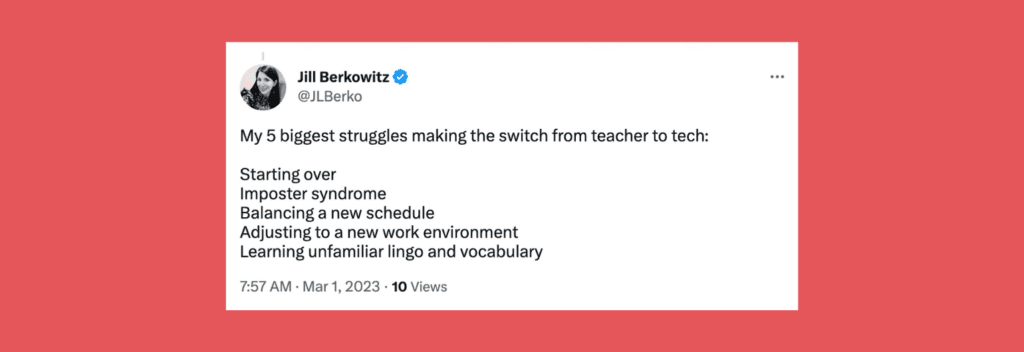
If you’re lacking confidence or feeling like a fish out of water, you might benefit from a structured program taught by experts, so you know you’re learning the right things and not wasting your time.
Similar to Tristan, TripleTen grad (and scholarship recipient) Tiffany Hall tried teaching herself to code but wasn’t feeling confident in what she was learning. She attended TripleTen’s Software Engineering bootcamp and instantly noticed a difference.
As a mom, she appreciated that there were a mix of different learning resources that fit her needs. TripleTen combines self-paced practice on the TripleTen interactive platform, live feedback from tech professionals, help from community managers, and guidance from tutors and senior students.
The curriculum is also constantly updated to fit industry advancements and employers’ evolving requirements.
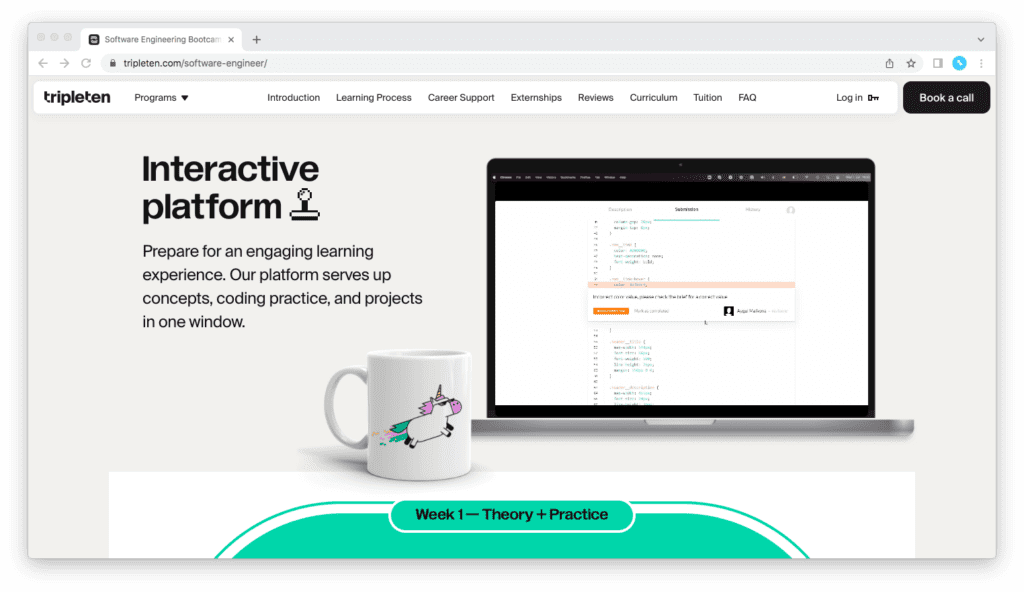
What really made Tiffany feel comfortable was knowing she wasn’t in it alone:
“I think the best part of the program itself, for me, is the community. I made a lot of friends. The very first meeting that we had […] was all of us on a screen together, and that was pretty rad, because then it was like, ‘Oh, this is real. This is really happening. These are real people.’”
☝️ Back to top
Fear #6: Is it too late for me to change careers? I’d be starting from scratch.
No matter how long you’ve been a teacher, it’s not too late to pursue new opportunities.
Loads of people have transitioned into tech from 40 onwards, after spending the first parts of their careers in totally different industries. Just check out all of these midlife career-changers!
For example, Carlos Giestas-Gomez had dedicated years of study and work to his career as a seismologist and physicist when he decided to change directions and took TripleTen’s Data Science course. Now, he’s started a brand-new career as a data scientist.
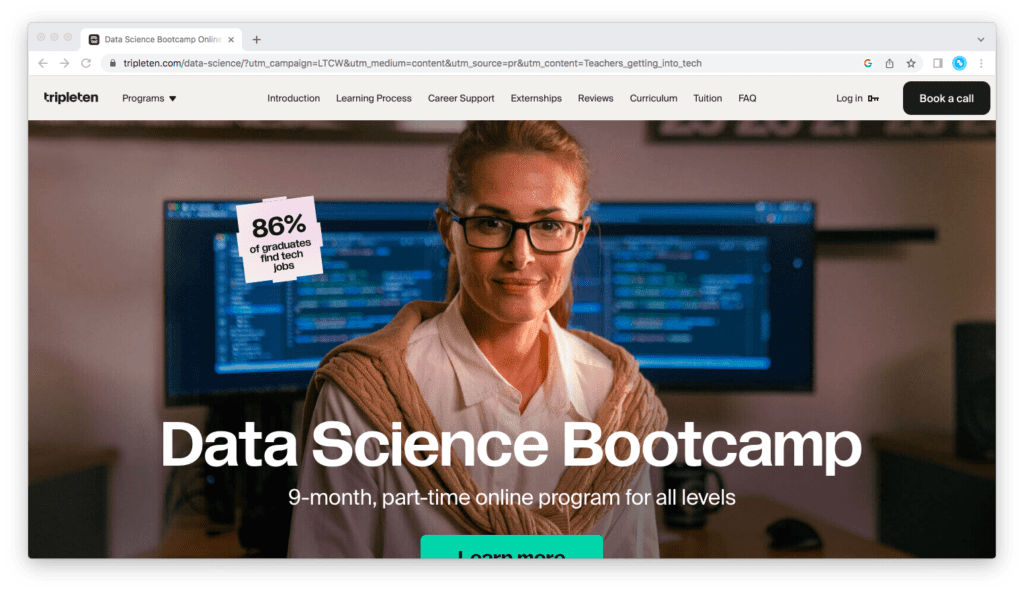
Teaching skills that transfer to other jobs
When you make a midlife career change from teaching to software/tech, you’re not starting from zero. You already have relevant knowledge and teaching skills that transfer to other jobs.
When you’re applying for new jobs in the tech industry, everyone you’ll be competing with will have tech skills, but not all of them will have the soft skills you’ve developed over the course of your career as a teacher.

We’ve already seen examples of people from completely unrelated careers who made the transition and found that some of their skills were transferable. You have more than just a few: there are so many teaching skills that transfer to other jobs.
They include:
- Communication with different stakeholders (students, administrators, parents > designers, product managers, clients, etc.)
- Critical thinking
- Problem solving
- Adaptability
- Creativity
- Project management
- Patience
- Ability to learn
- Information processing
- Growth mindset
- Time management
- Resilience
As Paul Rose says, “As a teacher, you have the most enormous set of knowledge, skills and attributes to draw upon and you most definitely can roll with the punches and still succeed.”
When I interviewed English-professor-turned-developer Bekah Hawrot Weigel for the podcast, she noted a similar thing:
“I have a master’s in English and it was maybe one of the best things I could have done to prepare me for where I am now. I learned how to research, how to dive into complex topics, how to think more theoretically about things. I think that understanding texts and understanding how to break things down was really helpful in learning how to understand and write code.”
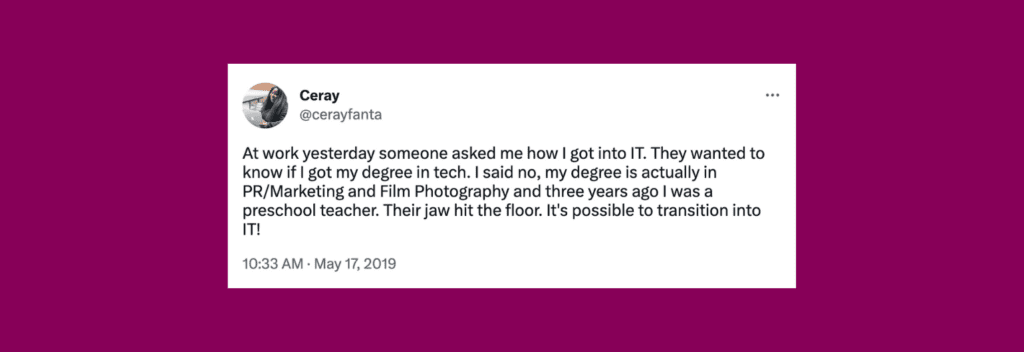
Using your skills to get tech jobs as a teacher
Once you’ve figured out which skills you can leverage in a tech job, it’s just a case of communicating those skills during your job search.
Victoria Thompson recommends having concrete examples of how your former teaching experience will be an asset on the job. She tweets:
“What are some strategies, practices, and procedures that you’ve used to handle things in the past? And how would these skills transfer into a new role?”
When you train with a program like TripleTen, help with job hunting and marketing yourself is built in. TripleTen’s bootcamp includes a whole separate career prep course and career acceleration program.
Just 13% of TripleTen’s students have a background in STEM, but the post-graduation hiring record speaks for itself:
- 87% of TripleTen’s students were hired within 180 days
- Over half of those received a job offer before they even graduated
- The median salary for TripleTen graduates is over $75,000
TripleTen even guarantees that you’ll get a job within 6 months of graduating, or they’ll refund your tuition money. Nice!
Start coding now
Stop waiting and start learning! Get my 10 tips on teaching yourself how to code.
Fear #7: I can’t afford to quit my job to retrain. Is it even possible to retrain while working or raising a family?
Transitioning from one career to another is no small feat—especially if you need to continue working while you retrain, or if you have children.
Be realistic about how much you can take on and find a program or approach to learning that fits with your life/responsibilities.

Tristan Boyd, who we met earlier, needed a program that would give him the flexibility to continue teaching and raising his children as he learned.
He enrolled part-time in the TripleTen Software Engineering Bootcamp and spent a few hours each day watching his kids, teaching, and working on TripleTen tasks.

Likewise, Tiffany Hall needed a program that would work with being a mom, and TripleTen fit the bill.
“I really liked it because it wasn’t all video, which is great because I am a mom and, a lot of the time, there is Paw Patrol or Marvel or something going on in the background, and I can’t listen to a video, like really listen to it.”
No matter what your needs are, TripleTen bootcamps are completely flexible:
- Fully online
- Part-time (20 hours a week)
- You can learn and practice at any time as long as you follow the curriculum
- Live workshops, Q&As, and co-working sessions usually take place on the weekends, so you can keep your job
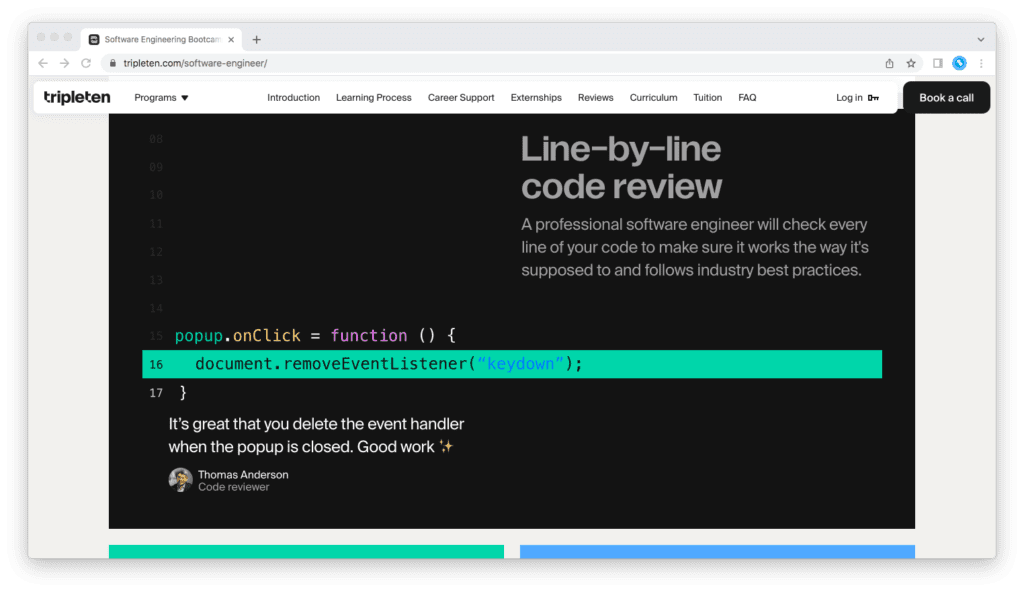
With a program like this, you can have the best of both worlds. Train for some of the best jobs for teachers leaving education—like software engineering and data science—without disrupting your life in the meantime. 😋
☝️ Back to top
Plan your teacher career change with TripleTen
If you’re dreaming of making your own career change from teaching to software, data, QA, or other tech jobs for teachers, TripleTen is a great place to start.
They offer beginner-friendly, online, part-time coding bootcamps to train you for a variety of second careers for teachers:
- Software Engineering Bootcamp
- Data Science Bootcamp
- Data Analytics Bootcamp
- Quality Assurance Bootcamp
- Business Intelligence Analytics Bootcamp
Not sure which path is right for you? Take their short career quiz.
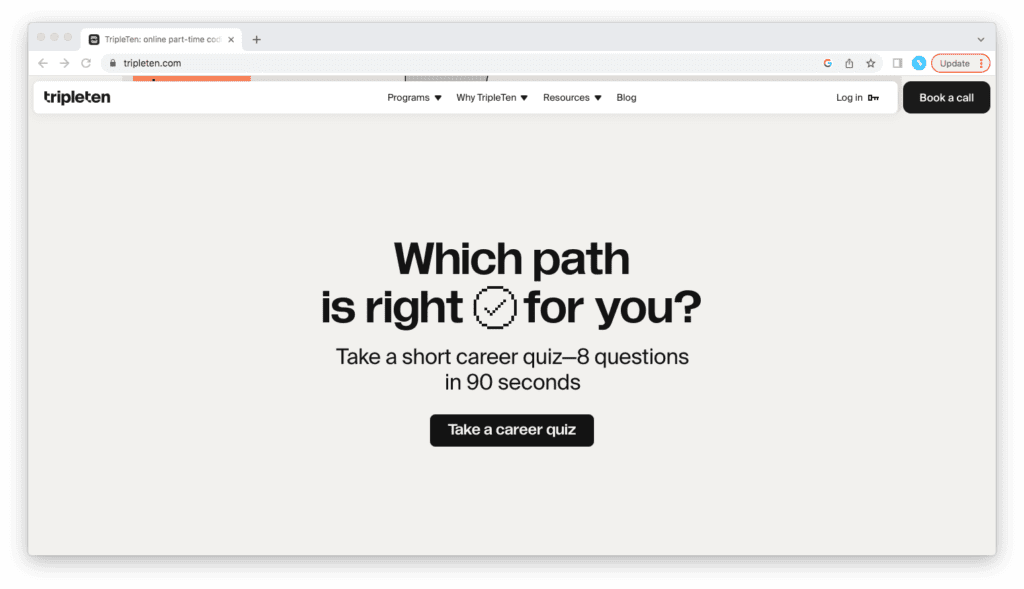
For anyone looking for the best jobs for former teachers, the tech industry is ready and waiting—and TripleTen could be just the gateway you need to enter it.
Got questions? Speak to an admissions counselor.
Note: This article contains Amazon affiliate links. As an Amazon Associate, I earn from qualifying purchases.

